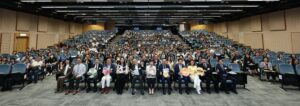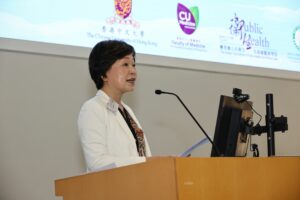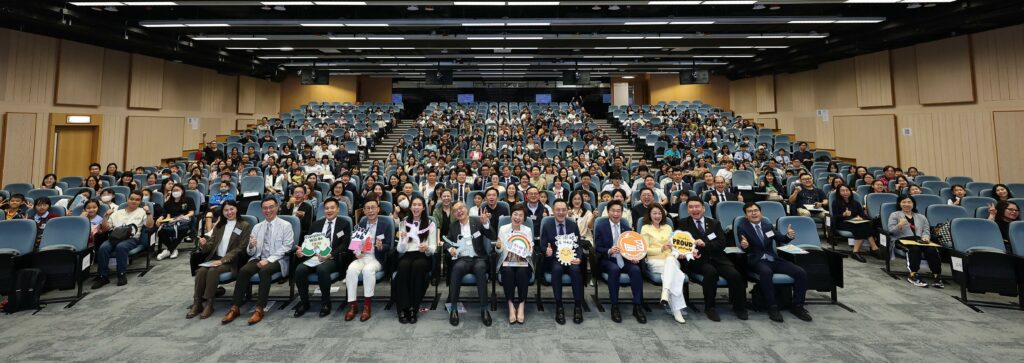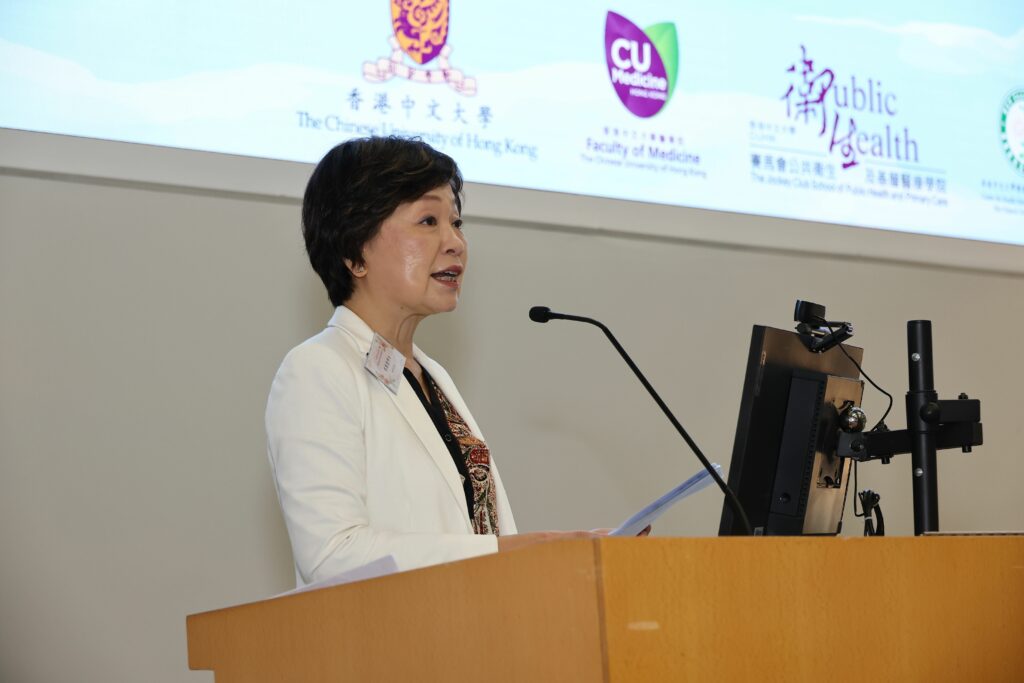CUHK
News Centre
CUHK hosts Healthy School Forum to promote early strengthening of school children’s resilience through cross-sector physical and mental wellness campaigns
The Centre for Health Education and Health Promotion (CHEHP) in The Jockey Club School of Public Health and Primary Care (JCSPHPC) at The Chinese University of Hong Kong (CUHK)’s Faculty of Medicine (CU Medicine) recently held the Healthy School Forum. The officiating guests at the event were Dr Choi Yuk-lin, Secretary for Education; Dr Lam Ching-choi, Chairman of the Advisory Committee on Mental Health; Dr Ronald Lam Man-kin, Director of Health; Professor Philip Chiu Wai-yan, Dean of CU Medicine; Professor Samuel Wong Yeung-shan, Director of JCSPHPC at CU Medicine; Miss Vivian Kong Man-wai, Women’s Épée Individual Gold Medallist at the 2024 Paris Olympic Games; Ms Scarlett Pong Oi-lan, Chairman of the Health Promoting School Advisory Committee; and Mr Paul Wong Yan-yin, District Officer (Sham Shui Po).
Study shows that a healthy lifestyle and self-efficacy may be crucial for resilience building in early secondary education
Professor Martin Wong Chi-sang, Director of CHEHP and Professor at JCSPHPC at CU Medicine, shared the findings of a survey his team recently conducted. Among the 1,704 local Secondary 1 to 4 (S1 to S4) student respondents for the current school year, 43% were male and nearly half (43%) were S1 students. Mental Toughness Scale (MTS) was used to assess their resilience[1].
The findings showed resilience may be associated with factors related to lifestyle and self-efficacy[2], such as “being male”, “better self-perceived health”, “having breakfast daily”, “a standard level of daily exercise”, “watching television or videos for less than two hours on weekdays”, “playing video games for less than two hours on weekdays”, “using social media for less than two hours on weekdays”, “higher self-efficacy” and “improved health literacy”. The association implied the importance of healthy living habits and positive thinking in developing adolescents’ resilience during early secondary education. Notably, the team observed a downward trend in students’ resilience as they advanced to higher senior secondary grades, reflected by an MTS score of 47 for S1 students, compared to a score of 45 for S4 students.
Government, school and community partnerships can foster stronger resilience among students
The researchers recommend that schools should provide students with a diverse range of curricula and activities, giving them opportunities to showcase their strengths and face challenges. Through the completion of learning tasks, students can develop problem-solving and collaboration skills, and become empowered with the knowledge and coping abilities to address major challenges in the future. The experience will enable students to view ups and downs with composure. Schools should also offer comprehensive mental wellness education programmes and support services, and organise activities regularly that teach students strategies to cope with psychological distress and adaptation issues.
Various guests attending the forum shared policies, stakeholders’ roles and outlook regarding a healthy school environment. Dr Choi Yuk-lin remarked: “It is the common goal of the Education Bureau and schools to enhance the physical and mental health of students, and to cultivate them with a positive attitude to overcome challenges and changes. Through such channels as the 4Rs Mental Health Charter and values education, we have spared no efforts in strengthening students’ mental health and resilience. Looking ahead, we will continue to help schools harness the resources in the community with cross-department and cross-sector collaboration, thereby fostering the growth and development of students in a healthy and positive environment.”
Dr Lam Ching-choi expressed his hope that all sectors of the community and educators can create an environment in society and schools that helps students develop the inner strength to respond proactively to challenges and remain resilient under pressure.
Dr Ronald Lam added: “To enhance students’ physical and mental health, thanks to the support from the Education Bureau, the Department of Health (DH) has launched the Whole School Health Programme to help participating schools gradually become Health Promoting Schools with reference to the Health Promoting School Framework advocated by the World Health Organization. The DH will compile an annual health report for each participating school and recommend targeted school-based measures to promote physical activity, healthy eating, mental health, and social well-being.” To achieve the goal of ‘Whole School, Whole Health’, he called for everyone’s concerted efforts to collaboratively build Health Promoting Schools, empowering students to overcome challenges and soar towards a bright future of physical and mental well-being.
Ms Scarlett Pong highlighted at the guest sharing session that resilience is an ability that can be acquired and developed. She remarked that building a strong support network is vital; and parents and teachers should consistently attend to students’ needs and prioritise setting phase-specific goals that leverage their strengths to enhance self-esteem. “Resilience functions like a muscle-it needs ongoing training to foster an environment for growing healthily and confidently, allowing students to stay strong when confronted with challenges,” she said.
Miss Vivian Kong added: “I hope schools, teachers, parents and students can prioritise sport for both physical and mental health because it is a universal language for compassion, resilience and hope. Fencing has taught me that I am stronger than I imagined, and I hope everyone can feel the same. Through sport, we learn to appreciate what is more important than medals – perseverance, sportsmanship, teamwork and the pure joy of being our best and most authentic self.”
Professor Martin Wong said: “The theme of our forum is ‘Triumph Over the Challenges, Soar into the Future’. We hope that students, while focusing on academic studies, can also maintain emotional wellbeing in adversity, respond to challenges with resilience, learn and grow from experience, and overcome obstacles with a positive attitude. We will also continue to implement health promotion activities, and analyse the status and trends of students’ physical health and mental wellbeing. Meanwhile, we will liaise with key stakeholders to explore strategies that promote the health of school children and empower them with the abilities to tackle more hurdles.”
1 The ability to prepare and plan for, absorb, recover from and more successfully adapt to adverse events, according to The American Psychological Association in 2012
2 The belief that one is capable of performing in a certain manner to attain certain goals.

With the theme "Triumph Over Challenges, Soar into the Future," the forum aims to engage with key stakeholders to explore strategies that promote the health of school children and empower them with the ability to tackle more hurdles.

Nearly 500 primary and secondary school students, teachers and parents attend the forum. During the event, the guests encourage everyone to view the ups and downs, successes and failures with composure.

Dr Choi Yuk-lin, Secretary for Education, emphasises that the Education Bureau will foster cross-department and cross-sector collaboration to promote a healthy and positive environment for school children.

Dr Lam Ching-choi, Chairman of the Advisory Committee on Mental Health, highlights the roles of educators and other sectors in promoting resilience.

Professor Martin Wong, Director of the Centre for Health Education and Health Promotion, CU Medicine, shares survey results indicating that physical and mental health wellbeing may help build resilience in early secondary education.

Professor Philip Chiu, Dean of CU Medicine (2nd from left); Professor Samuel Wong, Director of JCSPHPC, CU Medicine (1st from right); and Professor Martin Wong, Director of Centre for Health Education and Health Promotion of CU Medicine (1st from left) present the Appointment Certificate of CHEHP Health Ambassador to Ms Vivian Kong (2nd from right).

Ms Scarlett Pong (left), guest moderator and Chairman of the Health Promoting School Advisory Committee, and Ms Vivian Kong (right), Women's Épée Individual Gold Medallist at the 2024 Paris Olympic Games, share how they face adversity and boost resilience. Ms Pong highlights strategies such as "learning by doing" and "experiential learning," through which problem-solving skills can be cultivated. She also pinpoints "service learning", which helps build self-esteem and a sense of responsibility.

Dr Choi Yuk-lin, Secretary for Education (3rd from right); Dr Lam Ching-choi, Chairman of the Advisory Committee on Mental Health (4th from right), Dr Ronald Lam, Director of Health (middle); Ms Scarlett Pong, Chairman of the Health Promoting School Advisory Committee (4th from left); and Professor Martin Wong, Director of Centre for Health Education and Health Promotion, CU Medicine (3rd from left) present the Health Promoting School Gold Award and Foundation Awards to the awardee schools.

During the forum, over 300 primary and secondary school students were recognised for their support of school health activities and contributions to health promotion and services throughout the past year. Mr Eugene Fong Yick-jin, Chairman, Committee on Home-School Co-operation (1st from right); Ms Scarlett Pong, Chairman of the Health Promoting School Advisory Committee (middle) and Professor Martin Wong, Director of Centre for Health Education and Health Promotion, CU Medicine (1st from left) present the commendation certificates to Student Health Captains.












